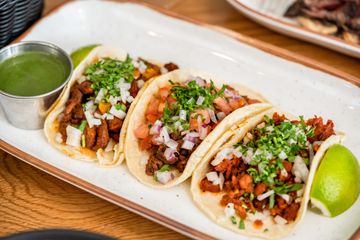Is Mexican Food Healthy? Unboxing the Nutritional Conveniences of Standard Ingredients
The inquiry of whether Mexican food is healthy welcomes an exploration of its conventional ingredients. Beans and corn act as fundamental staples, rich in protein and fiber. Avocados supply valuable fats, while different natural herbs and flavors add flavor and wellness advantages - lunch and dinner. Together, these parts produce a tapestry of nutrition. The healthfulness of Mexican food often depends on preparation techniques and portion dimensions. What function do these elements play in determining its overall nutritional value?
The Power of Beans: Healthy Protein and Fiber-Rich Staples
Commonly neglected, beans offer as a keystone of Mexican food, providing a wide range of nutritional advantages. Rich in protein, they are an exceptional plant-based alternative for those looking for to meet their nutritional protein needs. This high healthy protein web content sustains muscular tissue repair and development, making beans vital for both vegetarians and meat-eaters alike. Furthermore, beans are a phenomenal resource of nutritional fiber, which aids in food digestion and promotes a feeling of volume, possibly aiding with weight administration.
The selection of beans used in Mexican recipes, such as black beans, pinto beans, and kidney beans, adds to a diverse taste profile and can boost meals nutritionally. Beans are reduced in fat and consist of essential vitamins and minerals, including folate, iron, and magnesium. With each other, these attributes make beans an important component, providing both nutrition and sustenance in traditional Mexican fare.

Corn: a Versatile Grain With Nutritional Benefits
Corn attracts attention as a versatile grain basic to Mexican food, commemorated not just for its culinary applications yet also for its outstanding dietary profile. As a key active ingredient in recipes like tortillas, tamales, and pozole, corn offers essential nutrients that add to a well balanced diet. Rich in carbs, it serves as a considerable power source, while additionally being low in fat, making it a desirable option for various nutritional requirements.
Corn is a good source of dietary fiber, which helps in digestion and advertises satiation. It has considerable amounts of vitamins such as B-complex vitamins, which are crucial for basal metabolism. The visibility of anti-oxidants, especially carotenoids, contributes to total health and wellness by decreasing oxidative stress and anxiety. Furthermore, corn is gluten-free, accommodating those with gluten level of sensitivities. Overall, the nutritional advantages of corn underscore its importance in traditional Mexican food and its function in a healthy and balanced diet regimen.
Avocados: Healthy And Balanced Fats and Nutrients in Every Bite
Avocados play a significant duty in Mexican cuisine, complementing recipes with their luscious texture and abundant flavor. Beyond their cooking appeal, avocados are celebrated for their outstanding dietary profile. They are an abundant source of healthy and balanced monounsaturated fats, which can help lower negative cholesterol levels and assistance heart wellness. Additionally, avocados are loaded with essential vitamins and minerals, including potassium, vitamin E, and B vitamins, adding to general wellness.
The high fiber material in avocados aids food digestion and promotes satiation, making them a valuable enhancement to any meal. Their distinct nutrient structure can likewise support skin health and wellness and provide anti-inflammatory advantages. Incorporating avocados into standard Mexican recipes or appreciating them as a standalone snack can enhance both taste and nourishment, showing why they are a cherished staple in Mexican food. Generally, avocados use a tasty method to delight in healthy fats and important nutrients in every bite.

Spices and Herbs: Flavorful Health Boosters
While appreciating the rich tastes of Mexican food, one can not ignore the vital function that spices and natural herbs play in boosting both taste and wellness. Active ingredients such as oregano, cilantro, and chili peppers not only add to the vivid flavor profile however also supply considerable health and wellness benefits. Cilantro is understood for its detoxing buildings, aiding to eliminate heavy metals from the body, delmonico steak while oregano is loaded with antioxidants and possesses anti-inflammatory effects.
Chili peppers, a staple in several Mexican meals, consist of capsaicin, which has been linked to enhanced metabolic rate and pain relief. Furthermore, seasonings like cumin and coriander support food digestion and might aid in blood read what he said sugar level guideline. Including these delicious health boosters into meals not only improves the cooking experience but additionally promotes general well-being, making Mexican cuisine not just scrumptious, however also nutritionally advantageous.
Standard Cooking Techniques: Enhancing Nourishment and Flavor
Typical cooking techniques in Mexican food play a vital role in enhancing both nutrition and flavor, as they often prioritize classic strategies and fresh ingredients. Methods such as nixtamalization, where corn is soaked and prepared in an alkaline remedy, not just boost the nutrient account of tortillas however additionally enhance their digestibility - freshly made guacamole. Furthermore, using slow-moving cooking techniques, like cooking or braising, permits flavors to fuse beautifully while maintaining the integrity of the components

Often Asked Questions
Are Mexican Food Portions Usually Larger Than Other Foods?
Mexican food sections are often bigger than those of many a fantastic read other foods. This particular shows conventional dining techniques, emphasizing common sharing and hearty dishes, which can bring about an extra substantial serving dimension in general.
How Does the Preparation Approach Affect Healthfulness of Mexican Food?
Prep work approaches substantially influence the healthfulness of Mexican food. Techniques such as cooking or steaming preserve nutrients, while frying can boost harmful fat material. Selections of active ingredients and cooking designs inevitably figure out total nutritional value.
Can Mexican Food Be Customized for Particular Dietary Restrictions?
Mexican food can indeed be customized for details dietary constraints. Replacements, such as making use of corn tortillas for gluten-free diet regimens or integrating even more veggies, allow people to delight in typical flavors while fitting various dietary demands.
What Are Usual Mistaken Beliefs About Mexican Food and Health?
Typical misunderstandings concerning Mexican food consist of the belief that it is naturally harmful, overly hot, and solely concentrated on fats. In reality, traditional dishes usually feature nourishing ingredients and can be tailored to numerous dietary requirements.
Exist Healthier Alternatives at Mexican Dining Establishments?
Much healthier options at Mexican dining establishments often include smoked meats, beans, and fresh veggies. Choosing recipes that emphasize whole ingredients and avoiding hefty sauces can result in an extra nutritious dining experience, advertising total wellness.
The variety of beans used in Mexican meals, such as black beans, pinto beans, and kidney beans, adds to a varied flavor profile and can enhance meals nutritionally. Avocados play a considerable role in Mexican food, complementing dishes with their luscious structure and rich flavor. Integrating avocados into conventional Mexican recipes or enjoying them as a standalone snack can improve both taste and nutrition, showing why they are a beloved staple in Mexican food. While enjoying the abundant tastes of Mexican cuisine, one can not overlook the important duty that spices and natural herbs play in enhancing both taste and health. Conventional food preparation methods in Mexican cuisine play a crucial duty in improving both nutrition and taste, as they frequently prioritize fresh components and time-honored techniques.